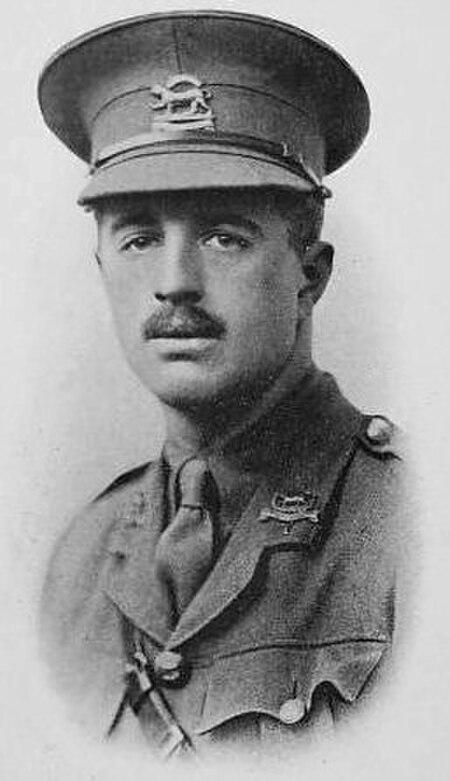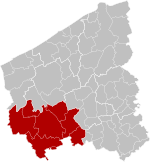The First Battle of Ypres (French: Première Bataille des Flandres, German: Erste Flandernschlacht, 19 October – 22 November 1914) was a battle of the First World War, fought on the Western Front around Ypres, in West Flanders, Belgium. The battle was part of the First Battle of Flanders, in which German, French, Belgian armies and the British Expeditionary Force (BEF) fought from Arras in France to Nieuwpoort (Nieuport) on the Belgian coast, from 10 October to mid-November. The battles at Ypres began at the end of the Race to the Sea, reciprocal attempts by the German and Franco-British armies to advance past the northern flank of their opponents. North of Ypres, the fighting continued in the Battle of the Yser (16–31 October), between the German 4th Army, the Belgian army and French marines.
The fighting has been divided into five stages, an encounter battle from 19 to 21 October, the Battle of Langemarck from 21 to 24 October, the battles at La Bassée and Armentières to 2 November, coincident with more Allied attacks at Ypres and the Battle of Gheluvelt (29–31 October), a fourth phase with the last big German offensive, which culminated at the Battle of Nonne Bosschen on 11 November, then local operations which faded out in late November. Brigadier-General James Edmonds, the British official historian, wrote in the History of the Great War, that the II Corps battle at La Bassée could be taken as separate but that the battles from Armentières to Messines and Ypres, were better understood as one battle in two parts, an offensive by III Corps and the Cavalry Corps from 12 to 18 October against which the Germans retired and an offensive by the German 6th Army and 4th Army from 19 October to 2 November, which from 30 October, took place mainly north of the Lys, when the battles of Armentières and Messines merged with the Battles of Ypres.
Attacks by the BEF (Field Marshal Sir John French) the Belgians and the French Eighth Army in Belgium made little progress beyond Ypres. The German 4th and 6th Armies took small amounts of ground, at great cost to both sides, during the Battle of the Yser and further south at Ypres. General Erich von Falkenhayn, head of the Oberste Heeresleitung (OHL, the German General Staff), then tried a limited offensive to capture Ypres and Mont Kemmel (Kemmelberg), from 19 October to 22 November. Neither side had moved forces to Flanders fast enough to obtain a decisive victory and by November both sides were exhausted. The armies were short of ammunition, suffering from low morale and some infantry units refused orders. The autumn battles in Flanders had become static, attrition operations, unlike the battles of manoeuvre in the summer. French, British and Belgian troops, in improvised field defences, repulsed German attacks for four weeks. From 21 to 23 October, German reservists had made mass attacks at Langemarck (Langemark), with losses of up to 70 per cent, to little effect.
Warfare between mass armies, equipped with the weapons of the Industrial Revolution and its later developments, proved to be indecisive, because field fortifications neutralised many classes of offensive weapon. The defensive firepower of artillery and machine guns dominated the battlefield and the ability of the armies to supply themselves and replace casualties prolonged battles for weeks. Thirty-four German divisions fought in the Flanders battles, against twelve French, nine British and six Belgian divisions, along with marines and dismounted cavalry. Over the winter, Falkenhayn reconsidered Germany strategy because Vernichtungsstrategie and the imposition of a dictated peace on France and Russia had exceeded German resources. Falkenhayn devised a new strategy to detach either Russia or France from the Allied coalition through diplomacy as well as military action. A strategy of attrition (Ermattungsstrategie) would make the cost of the war too great for the Allies, until one dropped out and made a separate peace. The remaining belligerents would have to negotiate or face the Germans concentrated on the remaining front, which would be sufficient for Germany to inflict a decisive defeat.











